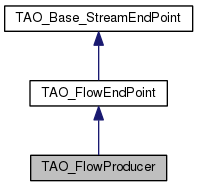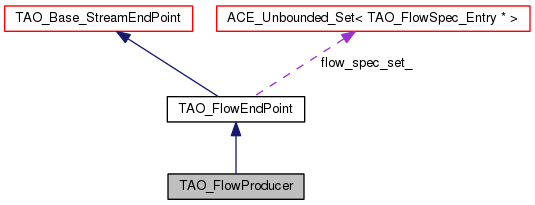|
TAO_AV
2.1.0
|
|
TAO_AV
2.1.0
|
#include <AVStreams_i.h>


Public Member Functions | |
| TAO_FlowProducer (void) | |
| default constructor | |
| TAO_FlowProducer (const char *flowname, AVStreams::protocolSpec protocols, const char *format) | |
| virtual char * | get_rev_channel (const char *pcol_name) |
| virtual void | stop (void) |
| stop this flow, to be overridden by the application. | |
| virtual void | start (void) |
| start this flow, to be overridden by the application. | |
| virtual char * | go_to_listen (AVStreams::QoS &the_qos, CORBA::Boolean is_mcast, AVStreams::FlowEndPoint_ptr peer, char *&flowProtocol) |
| virtual CORBA::Boolean | connect_to_peer (AVStreams::QoS &the_qos, const char *address, const char *use_flow_protocol) |
| virtual char * | connect_mcast (AVStreams::QoS &the_qos, CORBA::Boolean_out is_met, const char *address, const char *use_flow_protocol) |
| connect to the multicast address, not implemented. | |
| virtual void | set_key (const AVStreams::key &the_key) |
| sets the public key to be used for encryption of the data. | |
| virtual void | set_source_id (CORBA::Long source_id) |
Protected Attributes | |
| CORBA::Long | source_id_ |
| source id of this producer. | |
| CORBA::String_var | peer_address_ |
| TAO_FlowProducer::TAO_FlowProducer | ( | void | ) |
default constructor
| TAO_FlowProducer::TAO_FlowProducer | ( | const char * | flowname, |
| AVStreams::protocolSpec | protocols, | ||
| const char * | format | ||
| ) |
| char * TAO_FlowProducer::connect_mcast | ( | AVStreams::QoS & | the_qos, |
| CORBA::Boolean_out | is_met, | ||
| const char * | address, | ||
| const char * | use_flow_protocol | ||
| ) | [virtual] |
connect to the multicast address, not implemented.
| CORBA::Boolean TAO_FlowProducer::connect_to_peer | ( | AVStreams::QoS & | the_qos, |
| const char * | address, | ||
| const char * | use_flow_protocol | ||
| ) | [virtual] |
This should be implemented in both the FlowProducer and consumer and hence is pure virtual since we need to know the role of the flowendpoint to create appropriate protocol objects. eg. in SFP to create Producer Object/ Consumer Object.
Implements TAO_FlowEndPoint.
| char * TAO_FlowProducer::get_rev_channel | ( | const char * | pcol_name | ) | [virtual] |
get the reverse channel, to be used for feedback for protocols like UDP. @Naga: In the spec this is defined in the TAO_FlowProducer but it seems more reasonable for this to be in a FlowEndPoint since any of the flowendpoints can be made to listen. So in the case of UDP if the producer is listening and the consumer connects (logically) then the producer needs to know the reverse channel on its peer fep to send data to.
| char * TAO_FlowProducer::go_to_listen | ( | AVStreams::QoS & | the_qos, |
| CORBA::Boolean | is_mcast, | ||
| AVStreams::FlowEndPoint_ptr | peer, | ||
| char *& | flowProtocol | ||
| ) | [virtual] |
This should be implemented in both the FlowProducer and consumer and hence is pure virtual since we need to know the role of the flowendpoint to create appropriate protocol objects. eg. in SFP to create Producer Object/ Consumer Object.
Implements TAO_FlowEndPoint.
| void TAO_FlowProducer::set_key | ( | const AVStreams::key & | the_key | ) | [virtual] |
sets the public key to be used for encryption of the data.
| void TAO_FlowProducer::set_source_id | ( | CORBA::Long | source_id | ) | [virtual] |
sets the source id of this flow producer so that it can be used to distinguish this producer from others in the multicast case.
| void TAO_FlowProducer::start | ( | void | ) | [virtual] |
start this flow, to be overridden by the application.
| void TAO_FlowProducer::stop | ( | void | ) | [virtual] |
stop this flow, to be overridden by the application.
CORBA::String_var TAO_FlowProducer::peer_address_ [protected] |
CORBA::Long TAO_FlowProducer::source_id_ [protected] |
source id of this producer.
 1.8.0
1.8.0